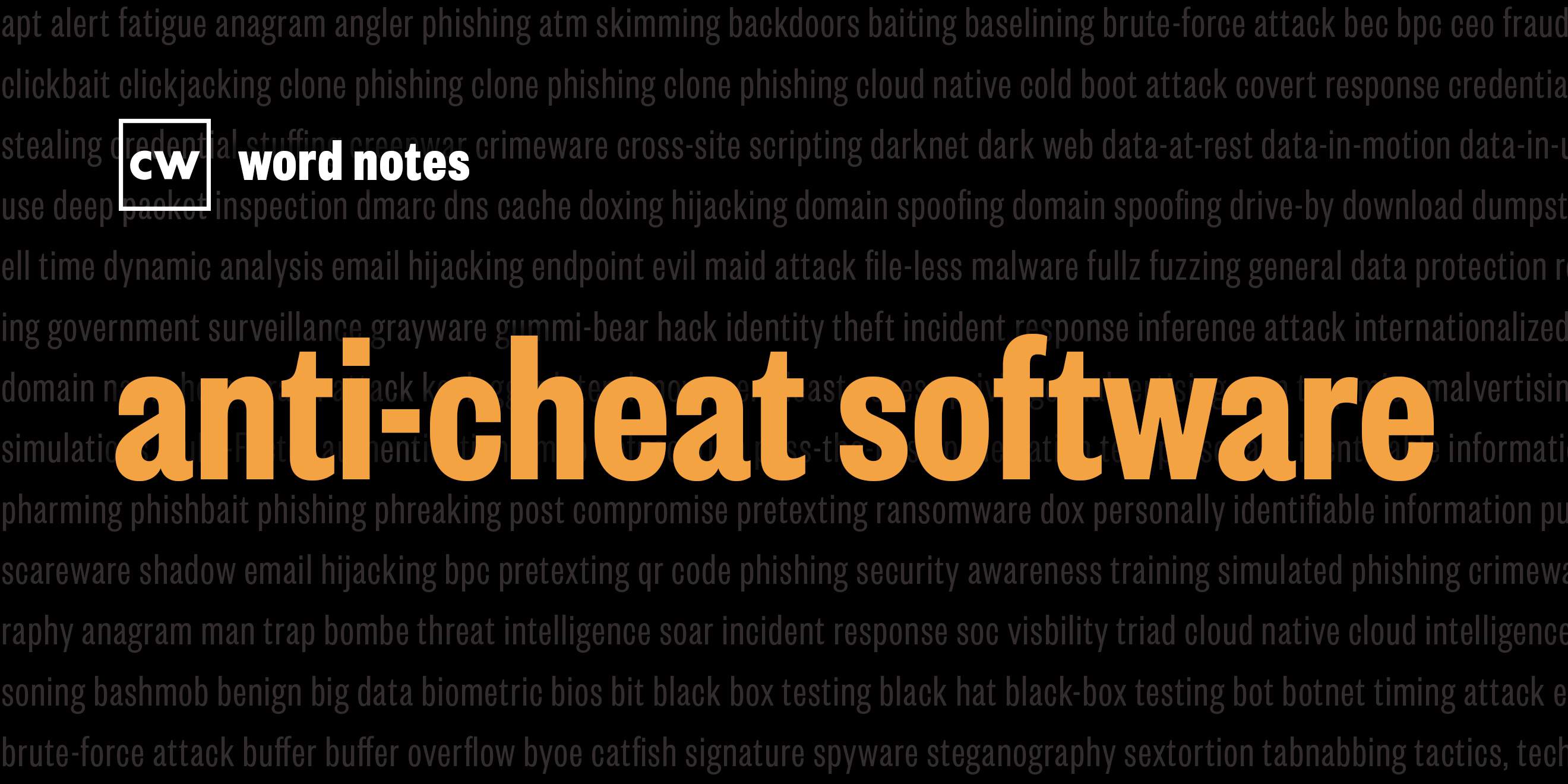
Anti-cheat software (noun)
Rick Howard: The word is: Anti-Cheat software
Rick Howard: Spelled: Anti as in against, cheat as in bypassing something for an advantage and a software as in a computer program.
Rick Howard: Definition: Software designed to prevent cheating in video games.
Rick Howard: Example Sentence: The anti-cheat software detected a player using aimbotting.
Rick Howard: Origin and context: According to A. Tarantola at Engadget, "For as long as we've played games, there have been players willing to break the rules in order to win. Whether it's rolling, weighted dice, counting cards, or hip checking pinball machines, you can bet your bottom dollar that if there's a game of chance, someone's working to work the odds in their favor".
Rick Howard: And it's not different for video games. In the early computer game days, developers created cheat codes to help them navigate their software more efficiently. They could enter a sequence of button presses that allow them to skip around the levels, become invincible or pull up a developer's console. Players also discovered accidental cheats by exploiting bugs in the game mechanics or by directly manipulating the game console's memory. But finding cheats in a single-player and local games, particularly in the early days of gaming was viewed as more of a fun hobby rather than anything malicious.
Rick Howard: Many of these games, intentionally included cheats to give players the option to modify the gameplay, such as the ability to spawn an invisible tank in Grand Theft Auto 3, or give characters giant heads in the Tony Hawk games. According to Engadget, "Doom, 2016, for the PC allows for an equally wide variety of cheat codes to be entered through the command line." Once online gaming took off, however cheating became a more serious problem.
Rick Howard: Users could install software that gave them an unfair advantage over millions of other players. By ruining the experience for everyone else, this can directly impact the reputation and revenue of the game developer, including multi-billion dollar first-person shooter franchises, like Activision-Blizzard’s Call of Duty, and Bungie’s Destiny 2.
Rick Howard: Game developers created anti-cheat software in response to this problem. And there are many different versions of this type of software: some are packaged in the game, some are installed separately on the computer, and some are hosted on the games online servers. This software has always required some trade offs of privacy, but it made headlines in 2020 when Riot games packaged a kernel-level anti-cheat software with its Valorant game.
Rick Howard: In modern operating systems, designers create levels of privilege or rings of privilege. For example, Ring 3, the least privilege, is where the normal everyday user operates. At Ring 3, you don't have permission to change anything on the computer.
Rick Howard: On the opposite end Ring 0, called the kernel, this is where the operating system runs. The operating system has the highest level of privilege because it has to manage how the computer functions. Software running at Ring 0 had better be error, free and efficient, or the computer itself becomes unstable.
Rick Howard: With the Riot Games, kernel-level anti-cheat software, according to Bryan Menegus at Wired, "An increasingly vocal subset of gamers are concerned that the software meant to detect and ban cheaters has become overly broad and invasive posing a considerable threat to their privacy and system integrity."
Rick Howard: In other words, why would we significantly increase the attack service and the stability of our computers in order to spend a few happy hours every day destroying seven-year-olds in Fortnite? I mean, it's fun, but it's probably not worth it.
Rick Howard: On the other hand, nobody likes a cheater and it takes the fun out of the game. If the seven year olds you're up against are running circles around you because they're cheating and you're not. Why would you pay the 50 bucks for the game, if you know that cheating within it is rampant?
Rick Howard: Microsoft announced a compromise in 2021 saying that it wouldn't be using Ring 0 or kernel-level anti-cheating software in its new Halo Infinite game.
Rick Howard: According to Wired, "Within days of launching the Halo subreddit exploded with complaints about the absence of anti-cheat measures." As in all things, achieving security is a collection of decision tradeoffs that either affect the level of security on one end or the efficiency or privacy of the system on the other. This is as true in the gaming industry, as it is in any other vertical.
Rick Howard: Nerd reference: In June of 2020, the YouTube channel Techquickie, broke down the current state of anti-cheat software in the gaming industry today.
Techquickie: Competing against other players online is a bigger part of video gaming today than it ever has been. So it's no surprise then that fair play online is being taken more and more seriously, both by gamers who view cheating as a huge impediment to their experience and by developers who are pushing anti-cheat software to keep players honest and of course, prevent gamers from just quitting a game because they're frustrated with how many cheaters there are on servers, but these anti-cheat mechanisms have come with some issues of their own. And notably, the solution implemented by Riot games for their hit shooter Valorant has really ruffled the feathers of many in the community.
Rick Howard: Word Notes is written by Tim Nodar, executive produced by Peter Kilpe, and edited by John Petrik and me, Rick Howard. The mix, sound design, and original music have all been crafted by the ridiculously talented Elliott Peltzman. Thanks for listening.

